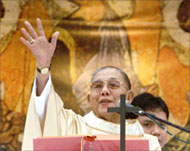Philippines’ Cardinal Sin dies
The Philippines’ Cardinal Jaime Sin, a driving force behind popular revolts that unseated two presidents, has died after a long illness. He was 76.

Sin, once called “the divine commander in chief” by former president Fidel Ramos, had been in intensive care for two days with an infection related to a long-standing kidney problem before he died early on Tuesday.
“History will mark this day of sadness when a great liberator of the Filipino people and a champion of God passed away,” President Gloria Macapagal Arroyo said in a statement.
“Cardinal Sin leaves a legacy of freedom and justice forged in deep personal courage.”
The main Roman Catholic radio station played hymns to mourn Sin, who retired as archbishop of Manila in 2003, and said a wake would be held at Manila cathedral.
People power
An ethnic Chinese, Sin shot to global prominence in 1986 when he rallied a million people to form human barricades on Manila’s main highway and protect a puny band of 300 army rebels against advancing tanks loyal to ruler Ferdinand Marcos.
|
“Cardinal Sin leaves a legacy of freedom and justice forged in deep personal courage” Gloria Macapagal Arroyo, |
His radio broadcasts in support of mutineers ignited the now legendary “People Power” revolt that drove Marcos into exile and swept political novice Corazon Aquino to the presidency.
Arroyo rose to the presidency in the second “People Power” mass protests that ousted former movie star Joseph Estrada in 2001. She faces allegations of electoral fraud that the government says is part of a plot to unseat her.
Mixed legacy
“My duty is to put Christ in politics. Politics without Christ is the greatest scourge of our nation,” Sin had said at the ceremony for his retirement as Manila archbishop.
Some say Sin’s legacy is mixed.
 |
|
Cardinal Sin helped the Philippine |
The 2001 uprising has been portrayed by some as an unconstitutional power grab by the Catholic Church in the Philippines and political elite angry at Estrada’s sweeping election win on a pro-poor agenda.
Analysts say the uprisings have left the Philippines with an unstable system in which politicians are quick to use the threat of “People Power” as a weapon against the incumbent president.
“His record, for me, would always be mixed,” said Nelson Navarro, an expert on Church affairs.
“He was correct in taking the Church to tackle the issues of the day. But he got enamoured with power and became a power broker.”
Political activism
|
“He was correct in taking the Church to tackle the issues of the day. But he got enamoured with power and became a power broker” Nelson Navarro, |
Sin’s departure from the office he had held for 27 years marked the end of a period of political activism by the Church, although it remains a potent force and a key backer of Arroyo.
Sin, ordained in 1954, became the youngest member of the Vatican’s College of Cardinals when he was made a prince of the church at the age of 47.
He was a staunch opponent of artificial birth control, and in August 1994 mobilised hundreds of thousands of people in a rally denouncing a state policy encouraging use of condoms and pills to curb rapid population growth.